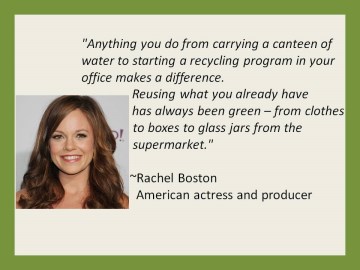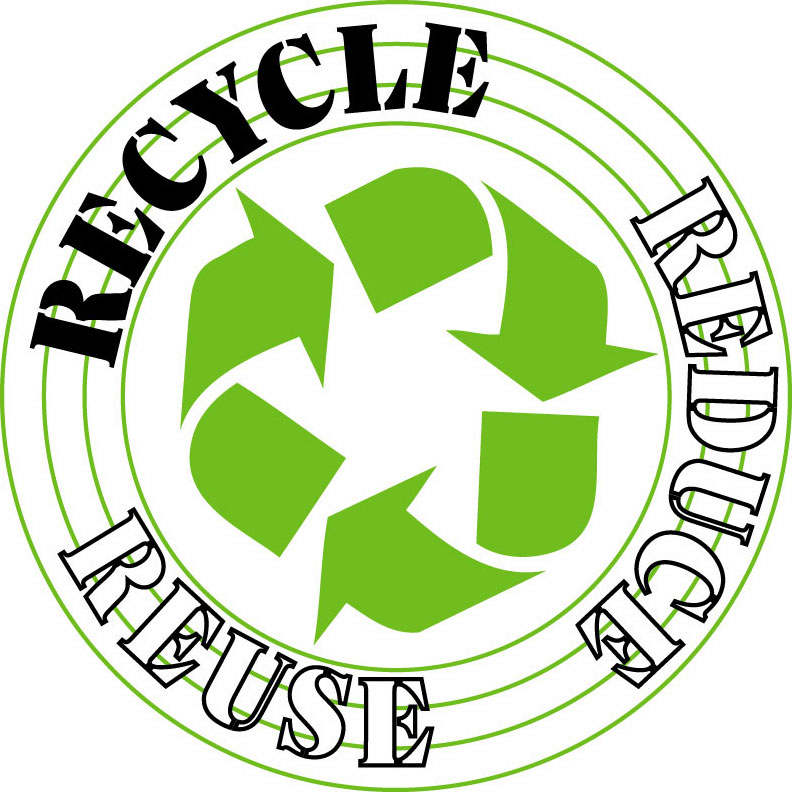
Do you own a storage locker–2 perhaps or even 3? Stay tuned to future issues for a deal to help you clean out that locker–once and for all!

Do you own a storage locker–2 perhaps or even 3? Stay tuned to future issues for a deal to help you clean out that locker–once and for all!

Think you can’t accomplish much in 15 minutes?
Check out Apartment Therapy’s article “15 Things You Can Organize While You’re Waiting for Your Show to Start.”
Haven’t got 15 minutes?
 “If I can do something in less than one minute, I don’t let myself procrastinate.
“If I can do something in less than one minute, I don’t let myself procrastinate.
I hang up my coat, put newspapers in the recycling, scan and toss a letter. Ever since I wrote about this rule in ‘The Happiness Project,’ I’ve been amazed by how many people have told me that it has made a huge difference in their lives.”
~Gretchen Rubin, American author
Ask yourself, “How can I be more productive?”

What can YOU do to recycle more?
 We’re well into January 2017 already!
We’re well into January 2017 already!
Have you been trying to get organized for a long time? Do you need to do a major clean out that involves disposing of a multitude of items and lots of garbage? Stop and rethink about disposal. People tend to frequently toss out items which still have a useful life.
In my work as a professional organizer, I encourage clients to follow the 3 R’s–Reduce, Reuse/Repurpose and Recycle.
If you live in Waterloo Region, new Waste Management restrictions come into effect on March 6. For residents of Kitchener, Waterloo and Cambridge, only 4 bags or cans of garbage can be put out for pickup. Excess bags will require tags which will cost you an additional amount. It’s important to note that garbage pickup will be reduced to once every two weeks.
Here are some pointers to help you begin that big project.
RESOLVING TO GET ORGANIZED
Have you already given up on your New Year’s resolutions?
“The biggest reason most people fail is that they try to fix too much at once – join a gym, get out of debt, floss after meals and have thinner thighs in 30 days.” Marilu Henner
Whether you need to organize your home, your office–or both–here are some ideas to help you succeed.
Planning
“Most of us start out with a positive attitude and a plan to do our best.” Marilu Henner
Set aside some time to think about what you want to organize. Make yourself a cup of your favourite beverage. Grab a pen and some paper. Did you know that if you write down your goals, you are more likely to achieve them?
It’s the start of a new year. Dream BIG—even if you think it’s unattainable. It’s amazing what you can accomplish when you break a big dream down into small projects.
Create a Master List
Go through your house thinking about one room at a time. Take photos of each room; decorators say you’re able to view it more objectively. Determine what functions each room has to fulfill. If the room has to perform multiple functions, create a different zone for each activity.
Your master list should contain all of the projects that you want to complete. Estimate how long you think each project will take. Be realistic.
The next step is to prioritize your list, and determine which room you will work on first. It’s best to start with the room that is bothering you the most.
Scheduling
When you schedule organizing sessions in your planner or calendar, you’re making a commitment to do the required work.
You may not be able to complete a room all at once. If necessary, divide it into sections, and work on one section at a time. If you only have one hour, pick a project from your list that you can complete in that time period.
Keep in mind that you don’t have to do all the work yourself. If you want to organize a number of areas, schedule a family meeting. Involving the whole family in the process can teach them valuable life-long skills. Just remember that children can’t stay focused as long as adults. Try to make it fun!
It’s also a good idea to schedule a snack break; prepare snacks ahead of time. Plan ahead–when cooking, double a recipe and freeze one batch. At the end of the day when you’re tired, you’ll have an easy meal!
Supplies
Stock up–garbage bags, recycle bin, empty boxes, cleaning supplies, rubber gloves, etc. Label boxes—Keep, Sell and Donate.
Use storage containers that you already own—the ones you emptied when you decluttered. For some items, you may need to purge before you can determine what type of containers you need.
Getting Started
“. . . don’t let perfectionism become an excuse for never getting started.” Marilu Henner
Harold Taylor, a leading Canadian time management expert, tells us studies have found that you’ll accomplish more if you focus on one task at a time.
Gather together everything you want to store in an area before you start organizing that space. Start by grouping similar items together, so it’s easier to make a decision about what to keep. Place items that belong elsewhere in a box just outside the room. It’s easy to become distracted if you leave the room.
Resist the urge to tell yourself, “I may need it someday!”
Take a break–set a timer–to keep up your energy level. This is especially important when working with children.
Storage
Similar items should be stored together and as close as possible to where they are used. An item is more likely to be put back if its home is close at hand.
Clear storage containers should be used as much as possible, so you can see what is inside. Be sure to label all containers.
Maintenance
Maintaining your organized space will require some effort from everyone. Make tidying up part of your children’s chores. Schedule a daily or weekly clean-up time, so things don’t get out of control. If you find something isn’t working, don’t give up. Schedule a family meeting; a small change may be all that’s required.
Rewards
When you’re done, don’t forget to reward your children and yourself for all your hard work!
So get started and turn over another leaf!
Until next month,
![]()
 It’s September!
It’s September!
I hope you had some time to relax during the summer. Cooler weather has arrived, and the leaves are starting to change colour.
For many people, fall means getting back into a busy routine. Time management often becomes a juggling exercise!
MANAGING YOUR TIME
What’s Most Important?
One of the critical steps in managing your time is establishing priorities. Set aside some time to think about what’s most important in your life.
Everyone has the same amount of time each day:
Time is one of your most valuable resources. You can’t store it or get it back once it’s gone. So why is it that some people are able to accomplish so much? The answer is simple. They have a plan.
Plan
In order to come up with a plan, you may need to start with your desired outcome and work backwards. If you take the time to create a plan first, it will pay off in the long run.
Prioritize
Set aside some time first thing in the morning to prioritize what needs to be done. It’s even better if you can do this at the end of the day. You’ll be more focused when you can jump right into the first task on your list.
Schedule
Take control. Set limits. If possible, schedule your most important or difficult tasks at the time of day when your energy levels are at their highest. Be realistic about how much will fit into your schedule. Just because there are 24 hours in a day, doesn’t mean that you have to schedule 18 of those hours. Schedule blocks of time in your planner or calendar for focused work time.
Remember–it’s OK to say NO. If you find yourself always saying YES, ask if you can get back to the person asking for your time. Once you’re away from that moment, you’ll be able to review your schedule and determine if you really do have the time to say yes.
Perfectionism
“Perfectionism is not attempting to be perfect when performing a task; it is the act of spending more time on a task, activity or decision than theresults justify.” Harold Taylor, Canadian Time Management Expert
Procrastination
Emmett’s Law states that “The dread of doing a task uses up more time and energy than doing the task itself.”
Brian Tracy uses ‘“eat that frog” as a metaphor for tackling the most challenging task of your day.
Multitasking
How many of you think you’re more productive when you multitask? Numerous studies have proven this to be untrue. It’s next to impossible to completely eliminate multitasking from our busy lives, but being aware that multitasking reduces your productivity is a step in the right direction.
Lateness/Missed Events
Are you on time? Not arriving on time shows that you are not respectful of other person’s time. When scheduling your day, remember to allow sufficient time to get to your destination. Set a timer or the alarm on your phone to remind you.
Do you miss events because you didn’t put them into your calendar? Make an effort to enter them into your calendar as soon as you make the commitment.
To-Do Lists/Planners
“To Do lists are intentions, but scheduled blocks of time in your planner are commitments.” Harold Taylor, Canadian time management expert
Delegate
Can you delegate an item on your to-do list? Ask yourself if YOU must complete the task. Remember—you are only one person, and there are only 24 hours in each day.
“You have the power and responsibility to decide what you do with the time you have, so choose wisely.” Matthew Jones, Contributor, Inc.com
So get started and turn over another leaf!
Until next month,
![]()
 SCHOOL IS JUST AROUND THE CORNER!
SCHOOL IS JUST AROUND THE CORNER!
It’s that time of year again. The relaxing days of summer are almost behind us. We’ve had such a warm summer already!
If you plan ahead, you’ll be ready for the first day of school.
Let’s get started and turn over another leaf!
GETTING ORGANIZED FOR BACK TO SCHOOL
Planning
Clothing
Have your children try on all of their clothing to see what still fits. Make a list of what is needed.
School Supplies
Has the school provided a list of supplies that will be required?
If you can, support a School Supply Drive in your area. There are always children in need.
Ensure that backpacks are the correct size for your children.
Lunches
Keep your cupboards well stocked with lunch items.
Labeling
Don’t forget to label all items your children take to school which need to be brought home each night or week.
Entryway/Mudroom
Have a designated spot for each child’s coat, mittens, boots, backpack and sports equipment.
Homework and Study Area
Make sure that your children have an area to do homework or study that is free from clutter, comfortable, well-lit and as quiet as possible.
Calendar and Scheduling
All activities should be put onto one calendar.
Your children need some time to just be kids!
Until next month,
![]()
P.S. Do YOU or someone you know need a professional organizer? TAKE OUR TEST and find out for yourself today!

If you’re itching to get outside to enjoy a beautiful day, check out “How to plan for a productive day.”
The sooner you get your work done, the sooner you can head outside!

“The man who removes a mountain begins by carrying away small stones.”
– Chinese Proverb
Check out Coaching Positive Performance’s 7 Tips in How to plan for a productive day.
The majority of people have too many items on their To Do List. Daunting lists can be overwhelming and make it more difficult to get started with accomplishing those tasks.
Check out Leslie Shreve’s article What NOT to Use in Your Task List and Why.
Ask yourself, “How can I be more productive?”
 At a recent consultation with a client who is getting her
At a recent consultation with a client who is getting her
home ready to sell, she asked me about renting a
dumpster. I told her to wait until we started the big
purge. So far a dumpster hasn’t been necessary.
During the purging process, she donated or recycled at least 95% of the items. There has only been a small amount of garbage.
Do you or your children purchase clothing at H&M? Recycle some old clothes and earn a small discount ($5 on purchases of $30 or more in store). Learn more about the Close the Loop initiative–fabric recycling programme.
There is a Dress for Success Drive at the Inspiring Women event in Kitchener on September 24. Attendees are asked to donate business appropriate clothing, shoes, and accessories to help empower local women entering the workforce. Donations are accepted by The Green Door. For more information, click here.
Do you just throw out your children’s old markers? Crayola’s Colorcyle program is being tested in a number of Canadian cities; any brand of marker is accepted. Spread the word–teachers at your children’s schools may find this program helpful. A bit of volunteer time is required, but there is no monetary cost to join the program.
Did you know that you can recycle used pens, markers and highlighters through the TERRACYCLE program? Drop off items at your local Staples store.
And last but not least, Textbooks for Change is a social venture that provides affordable and accessible educational materials to students both locally and abroad. If you live in Southwestern Ontario, you can make a difference by donating university textbooks (10 years old or less).
Reduce what ends up in our landfills. Get motivated to recycle!
Connect with us Online